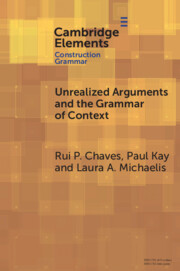Element contents
Unrealized Arguments and the Grammar of Context
Published online by Cambridge University Press: 31 July 2025
Summary
Information
- Type
- Element
- Information
- Series: Elements in Construction GrammarOnline ISBN: 9781009663786Publisher: Cambridge University PressPrint publication: 04 September 2025
References
Accessibility standard: Inaccessible, or known limited accessibility
Why this information is here
This section outlines the accessibility features of this content - including support for screen readers, full keyboard navigation and high-contrast display options. This may not be relevant for you.Accessibility Information
Content Navigation
Allows you to navigate directly to chapters, sections, or non‐text items through a linked table of contents, reducing the need for extensive scrolling.
Reading Order & Textual Equivalents
You will encounter all content (including footnotes, captions, etc.) in a clear, sequential flow, making it easier to follow with assistive tools like screen readers.
You get concise descriptions (for images, charts, or media clips), ensuring you do not miss crucial information when visual or audio elements are not accessible.
Visual Accessibility
You will still understand key ideas or prompts without relying solely on colour, which is especially helpful if you have colour vision deficiencies.
Structural and Technical Features
You gain clarity from ARIA (Accessible Rich Internet Applications) roles and attributes, as they help assistive technologies interpret how each part of the content functions.
Video Abstract: Elements in Construction Grammar: Unrealized Arguments and the Grammar of Context: Rui P. Chaves, Paul Kay and Laura A. Michaelis
- 1
- Cited by
